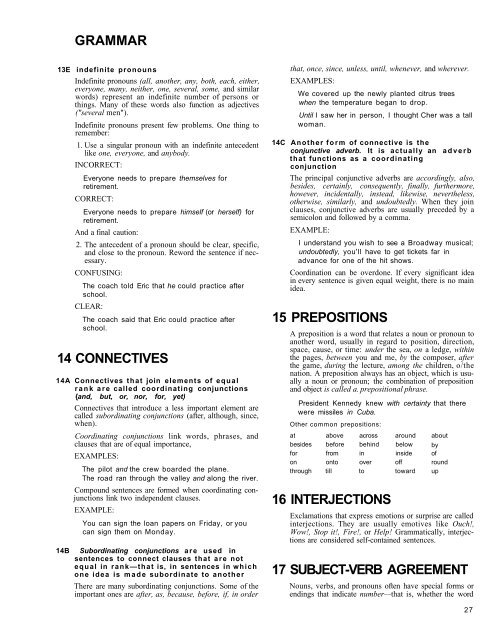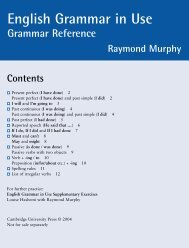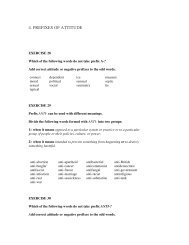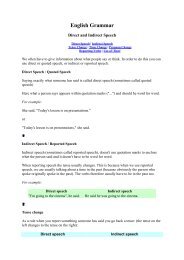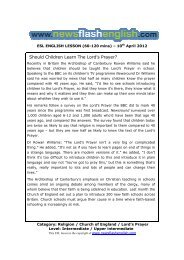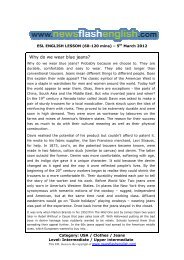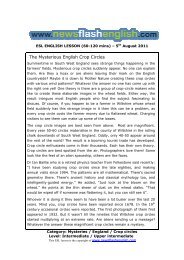TO DOWNLOAD - 75 Pages (928kb - PDF format) - ESL Teachers ...
TO DOWNLOAD - 75 Pages (928kb - PDF format) - ESL Teachers ...
TO DOWNLOAD - 75 Pages (928kb - PDF format) - ESL Teachers ...
Create successful ePaper yourself
Turn your PDF publications into a flip-book with our unique Google optimized e-Paper software.
GRAMMAR13E indefinite pronounsIndefinite pronouns (all, another, any, both, each, either,everyone, many, neither, one, several, some, and similarwords) represent an indefinite number of persons orthings. Many of these words also function as adjectives("several men").Indefinite pronouns present few problems. One thing toremember:1. Use a singular pronoun with an indefinite antecedentlike one, everyone, and anybody.INCORRECT:Everyone needs to prepare themselves forretirement.CORRECT:Everyone needs to prepare himself (or herself) forretirement.And a final caution:2. The antecedent of a pronoun should be clear, specific,and close to the pronoun. Reword the sentence if necessary.CONFUSING:The coach told Eric that he could practice afterschool.CLEAR:The coach said that Eric could practice afterschool.14 CONNECTIVES14A Connectives that join elements of equalrank are called coordinating conjunctions{and, but, or, nor, for, yet)14BConnectives that introduce a less important element arecalled subordinating conjunctions (after, although, since,when).Coordinating conjunctions link words, phrases, andclauses that are of equal importance,EXAMPLES:The pilot and the crew boarded the plane.The road ran through the valley and along the river.Compound sentences are formed when coordinating conjunctionslink two independent clauses.EXAMPLE:You can sign the loan papers on Friday, or youcan sign them on Monday.Subordinating conjunctions are used insentences to connect clauses that are notequal in rank—that is, in sentences in whichone idea is made subordinate to anotherThere are many subordinating conjunctions. Some of theimportant ones are after, as, because, before, if, in orderthat, once, since, unless, until, whenever, and wherever.EXAMPLES:We covered up the newly planted citrus treeswhen the temperature began to drop.Until I saw her in person, I thought Cher was a tallwoman.14C Another form of connective is theconjunctive adverb. It is actually an adverbthat functions as a coordinatingconjunctionThe principal conjunctive adverbs are accordingly, also,besides, certainly, consequently, finally, furthermore,however, incidentally, instead, likewise, nevertheless,otherwise, similarly, and undoubtedly. When they joinclauses, conjunctive adverbs are usually preceded by asemicolon and followed by a comma.EXAMPLE:I understand you wish to see a Broadway musical;undoubtedly, you'll have to get tickets far inadvance for one of the hit shows.Coordination can be overdone. If every significant ideain every sentence is given equal weight, there is no mainidea.15 PREPOSITIONSA preposition is a word that relates a noun or pronoun toanother word, usually in regard to position, direction,space, cause, or time: under the sea, on a ledge, withinthe pages, between you and me, by the composer, afterthe game, during the lecture, among the children, o/thenation. A preposition always has an object, which is usuallya noun or pronoun; the combination of prepositionand object is called a. prepositional phrase.President Kennedy knew with certainty that therewere missiles in Cuba.Other common prepositions:atbesidesforonthroughabovebeforefromontotillacrossbehindinoverto16 INTERJECTIONSaroundbelowinsideofftowardaboutbyofroundupExclamations that express emotions or surprise are calledinterjections. They are usually emotives like Ouch!,Wow!, Stop it!, Fire!, or Help! Grammatically, interjectionsare considered self-contained sentences.17 SUBJECT-VERB AGREEMENTNouns, verbs, and pronouns often have special forms orendings that indicate number—that is, whether the word27


